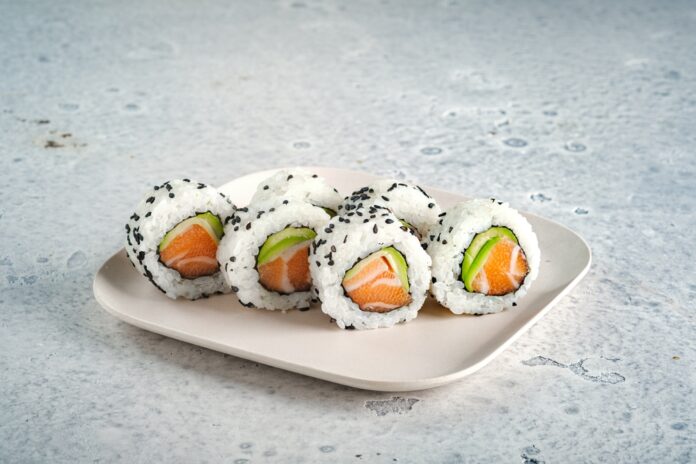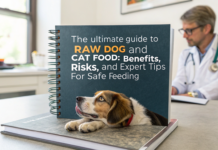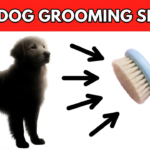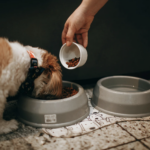Last Updated on July 31, 2024 by Dog Lover
Can Dogs Eat Sushi? Vet-Verified Answers & Key Facts
If you’re wondering, “Can dogs eat sushi?” you’re not alone. The sushi market has boomed recently, with sales increasing over 23% from 2021 to 2022. As a healthy alternative to fried foods or red meat, it’s no surprise people are curious about sharing it with their pets.
Sushi generally refers to cold, cooked rice topped or rolled with fish and other ingredients. For our discussion, we focus on plain rice topped with fish or seafood only.
Dogs can eat sushi if the protein is cooked and all ingredients are plain. However, this isn’t straightforward. There are caveats to feeding canines human foods.

Why Dogs Can Eat Sushi
Many reasons why dogs can eat sushi overlap with why you enjoy it. Many varieties are low in calories and fat.
If cooked and made without harmful ingredients, it isn’t dangerous to canines and can offer some health benefits.
Sushi isn’t processed food, which is another plus. Its small pieces make portion control easy, and you can find it freshly prepared at many grocery stores.
Benefits of Feeding Sushi to Dogs
Most fish used in sushi, like tuna and salmon, are rich in omega-3 fatty acids, phosphorus, and potassium.
They are also low in calories. For example, a piece of tuna sushi contains only 35 calories, while salmon has 37.4 calories. These benefits make sushi appealing, but there are risks too.

The Downside of Feeding Sushi to Dogs
One downside is cost. Sushi can be pricey, and one piece is unlikely to satisfy many pets. For example, a 10-pound dog should only get around 300-340 calories per day.
A couple of pieces can make a significant dent in their daily intake without providing complete nutrition.
Treats like sushi should only make up 10% of your dog’s daily caloric intake to avoid weight gain and obesity.
Salt Content
Salt is a concern with sushi due to the sodium in the protein and soy sauce. For example, a piece of salmon sushi contains 111 milligrams of sodium, while tuna has 107 milligrams. Dogs only need about 200 milligrams of sodium per day.
Soy sauce is even more problematic, with a tablespoon containing 878 milligrams of sodium. Even low-sodium soy sauce contains 511 milligrams.
Excessive salt can lead to symptoms like vomiting, weakness, diarrhea, muscle tremors, and seizures, and can be fatal if consumed in large amounts.
Wasabi
Wasabi, often served with sushi, is another concern. Dogs are unlikely to enjoy its pungency, and ingestion can cause digestive upset. Plain, cooked sushi is okay, but wasabi should be avoided.
Fat Content
While fish used in sushi are low in fat, ingredients like cream cheese or avocado in some rolls can negate nutritional value.
Avocado can cause gastrointestinal distress in dogs, and excessive calories can lead to weight gain and obesity.
Allergies
Dogs are more likely to be allergic to animal-based proteins than grains. Common allergens include dairy, beef, and chicken, while grains rarely cause issues.
Food allergies can cause gastrointestinal issues and itchy skin in dogs.

Foodborne Illnesses and Parasites
Raw fish in sushi carries the risk of foodborne illnesses and parasites.
Salmon poisoning, caused by the bacteria Neorickettsia helminthoeca, is fatal in dogs if untreated. Proper storage and preparation of raw food are essential to avoid these risks.
How to Feed Your Dog Sushi
Only give your dog plain, cooked sushi with minimal ingredients. Ensure it doesn’t include unsafe ingredients like onions and garlic.
Sushi should not be a regular part of your dog’s diet, but an occasional small bite is usually safe.
Frequently Asked Questions (FAQs)
Is It Safe for My Dog to Eat Rice?
Rice is common in many commercial dog foods. Most pets digest it without issues. However, if it’s your dog’s first time eating rice, give a small amount and observe their reaction.
Is Nori Safe for Dogs?
Nori, or edible seaweed, is non-toxic to dogs and safe in small amounts if plain and unseasoned. Dogs with thyroid issues should avoid seaweed due to its iodine content.
What Are the Signs of a Problem With Sushi?
Vomiting and diarrhea are common red flags. Salt toxicity signs may take a few hours to appear and can include vomiting, diarrhea, muscle tremors, and seizures. Immediate veterinary attention is recommended if these symptoms occur.
Conclusion
Sharing sushi with your dog can be tempting, but it’s important to be cautious. Ensure the sushi is plain and cooked, and avoid ingredients like wasabi and soy sauce.
Consult your vet if you have any concerns about feeding sushi to your dog.
- https://www.statista.com/statistics/1176560/sushi-restaurant-industry-market-size-us/
- https://www.avma.org/resources-tools/avma-policies/raw-or-undercooked-animal-source-protein-cat-and-dog-diets
- https://fdc.nal.usda.gov/fdc-app.html#/food-details/2344454/nutrients
- https://fdc.nal.usda.gov/fdc-app.html#/food-details/2344456/nutrients.
- https://www.petobesityprevention.org/pet-caloric-needs
- https://vetnutrition.tufts.edu/2016/01/what-are-safe-and-healthy-treats-for-my-pet/
- https://www.vettimes.co.uk/app/uploads/wp-post-to-pdf-enhanced-cache/1/sodium-chloride-tripolyphosphate-or-nitrite-do-dogs-really-need-salt.pdf
- https://fdc.nal.usda.gov/fdc-app.html#/food-details/174277/nutrients
- https://fdc.nal.usda.gov/fdc-app.html#/food-details/172473/nutrients
- https://vetmeds.org/pet-poison-control-list/salt/#!form/PPCDonations
- https://pubmed.ncbi.nlm.nih.gov/18656843/
- https://www.foodnetwork.com/how-to/packages/food-network-essentials/what-is-wasabi
- https://www.aspca.org/news/scoop-avocado-and-your-pets
- https://vetnutrition.tufts.edu/2017/01/food-allergies/
- https://pubmed.ncbi.nlm.nih.gov/31820885/
- https://pubmed.ncbi.nlm.nih.gov/20044285/
- https://petnutritionalliance.org/resources/calorie-calculator?type=dogs

















